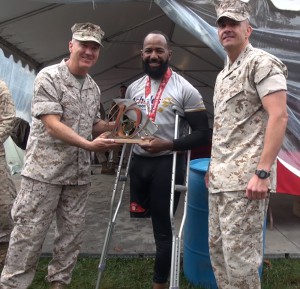
Retired Army Staff Sergeant, Alfredo “Freddy” De Los Santos awarded the 40th Marine Corps Marathon, 1st place hand cyclist trophy. (Angela G. Barnes/Medill NSJI)
De Los Santos, born in the Dominic Republic and now a resident of Hopewell, New York, was one of 200-hand cyclists, who showed their strength and determination in the marathon. He said his victory wasn’t easy.
“I trained six days a week, between 40 and 60 miles every day,” said the 44-year-old champion. “…to be able to compete in the Marine Corps Marathon despite my disabilities…I love it.”
Elsie Moore, a licensed clinical social worker and program manager for the Transition and Care Management Program at the Washington VA Medical Center, said specialty hand bikes have helped many maimed soldiers.
“Adaptive sports have been around a long time,” she said. “But it certainly made a boost when these soldiers came back severely wounded and couldn’t do things the way they normally use to do.”
Hand cycling, an adaptive sport, is a human-power tricycle operated by the arms instead of the legs. This allows lower-body disabled persons the same functionality as on a two-wheel bike. This unit has three wheels to support the cyclist: two-rear wheels and one powered steerable front wheel.
De Los Santos lost part of his right leg below the knee on Oct. 20, 2008, when his Humvee was hit by a rocket-propelled grenade while he was serving in a Special Operations Command in Iraq.
“It’s kind of weird…I always feel like this is the best thing that ever happened to me,” said De Los Santos. “It never crossed my mind to get into sports and now I’m in the best shape of my life.”
De Los Santos used the adaptive sport to deal the pain of losing part of his right leg, but said the service prepared him for this new journey.
“Somehow as being military you’re mentally prepared for something like this,” De Los Santos said. “So all you have to do is transition.”
Moore, who has worked with the VA more than 20 years, said while the VA’s Transition Care Management program provides a variety of services to wounded soldiers; many of them have a difficult time dealing with a loss of this magnitude.
“Some people can feel very bitter toward the losses that they have,” Moore said. “Those who are going to do best are those who are more flexible and open to therapy, treatment, counseling and mentorship.”
Although De Los Santos still has physical problems, he said his injury has not defined him.
“This is so rewarding,” he said again, “to be able to incorporate myself in society, physically, mentally and socially…I love it.”
“A large majority of amputees that I come in contact with, they’re often very positive,” Moore said. “They are “gun-ho” about what their goals are.”
“This is a way of life,” De Los Santos said. “Life is what you make out of it.”
De Los Santos hopes to qualify for next year’s 2016 Marine Corps Marathon. He finished the 2015 race in one hour-thirteen minutes.





